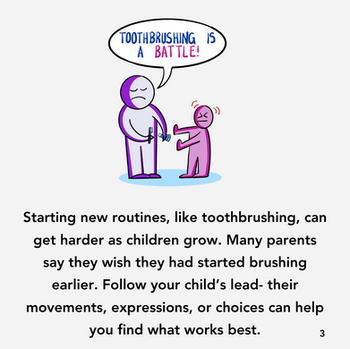
Types of toothbrushes
Overview
Parents have told us that finding the right toothbrush can take time and may involve trying a few options. Since children have different sensory needs, there's no single solution. You likely already know a lot about your child’s sensory preferences- what they like and dislike in terms of textures, colours, temperatures, and movements during everyday activities like play, mealtime, or getting dressed. This can be helpful when introducing a toothbrush. Below are the most common ones used by families.

Plastic toothbrush
Can be useful if:
-
Your child has sensitive teeth or gums
-
Your child is sensory seeking and likes a firmer sensation of the toothbrush on their teeth and gums
-
Your family includes more than one child
-
If your child likes the movement of the toothbrush around the mouth (back and forth)
-
Your child prefers quieter toothbrushes
Electric toothbrush
Can be useful if:
-
Your child enjoys pressure on their gums/teeth
-
Your child often cleans the same area of the mouth repeatedly or struggles with transitions
-
You want to get to those hard-to-reach places
-
Your child wants to hold the toothbrush with you
-
You (or your child) want to change the settings (e.g. pressure)
-
You want to make toothbrushing engaging


Three-sided toothbrush
Can be useful if:
-
Your child has heightened sensory sensitivity
-
You are looking for a brush easier to use
-
Your child can only brush for a short period of time
-
If your child likes the movement of the toothbrush around the mouth (back and forth)
-
If your child has a strong gag reflex
-
If your child bites the toothbrush
Bamboo toothbrush
Can be useful if:
-
Your child likes the feeling of a wooden handle
-
Your child is sensitive to standard toothbrushes
-
Your child does not like the temperature of plastic toothbrushes
-
If your child likes the movement of the toothbrush around the mouth (back and forth)
-
If your child is sensitive to sound or likes the sound of the bristles
-
You or your child are conscious of the impact of plastic waste on the environment

Recommended by families
Tell us what works for your family! Does your child have a favourite toothbrush or toothpaste? Is there a brushing routine or trick that helps make things easier at home? We’d love to hear your ideas, your tips could help other families.
Key messages

Watch again
Jump straight to what parents and early years professionals have said about different toothbrushes and how you can adapt them





